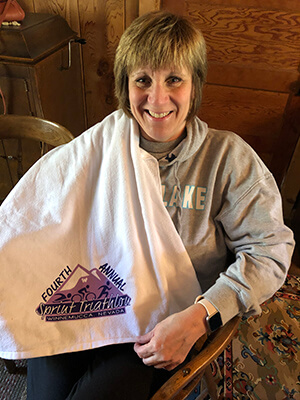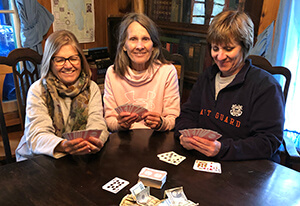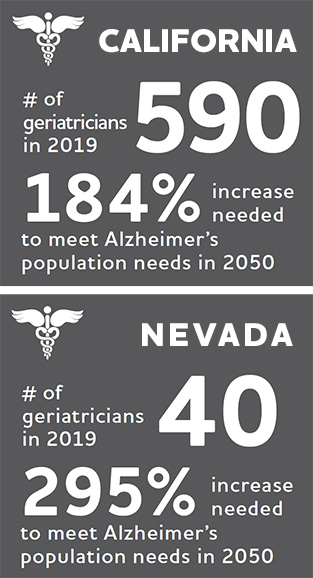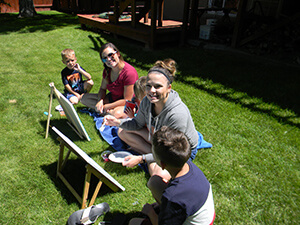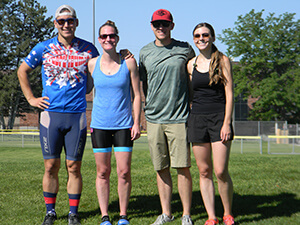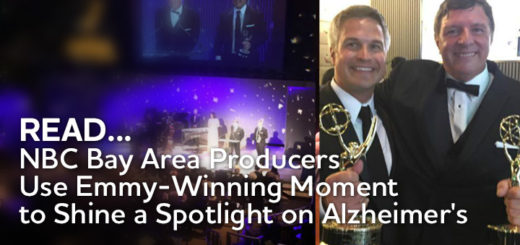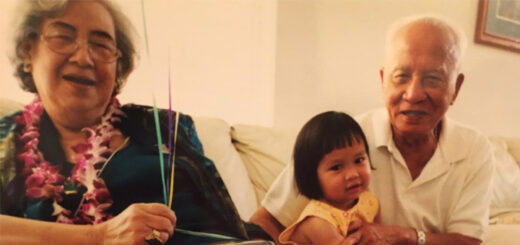Winnemucca resident fights for better dementia access in rural communities
Gini Cunningham is the unofficial “go-to” person for dementia resources in Winnemucca, Nevada. Having both a mother and a sister who died with dementia, Gini has made it her passion to help others dealing with dementia in her community. In addition to advocating for an accurate dementia diagnosis, Gini is currently raising funds for dementia care, support and research through The Longest Day®.
A mother with dementia
Gini Cunningham had two family members with dementia, her mother Elenore and her sister Carol. “They were both wonderful, kind, gentle, loving, caring, tender, positive people,” said Gini. “They stayed that way until the end.”
In 1986, Gini and her sisters began to notice that Elenore’s behavior was changing. On several occasions Elenore would be on the phone with one of her five daughters when the cat would distract her. Elenore would put the phone down to get the cat, and never come back to the call, forgetting she had even been on the phone in the first place.
Gini took her mother to a doctor who talked about Elenore as if she wasn’t in the room. The doctor left without any recommendations as to what to do next. He prescribed Elenore a medication, but Gini is unsure if it was a medication related to dementia. She’s not even confident her mother’s doctor knew about dementia.
Elenore, who lived alone in Idaho, moved across the state to be closer to her eldest daughter. Eventually Elenore moved into a care setting. One day, the care setting suddenly closed, giving both residents and staff less than one day’s notice to leave. Elenore’s daughter brought her mother home and was lucky enough to be able to hire a few of the staff members who had just lost their jobs to help with Elenore’s in-home care.
Elenore remained at home until she died in 1990 at the age of 79.
Getting lost
As Elenore’s journey with dementia was coming to an end, one of her daughters, Carol, was just beginning hers. “I think my other sisters and Carol were seeing [the signs of dementia],” said Gini. “I’m the baby and Carol didn’t share that information with me.”
At first, Gini’s family noticed that Carol would wander off or pour orange juice on her pancakes. “She knew pouring orange juice on her pancakes was wrong and she’d start to cry,” said Gini. “As she progressed, the times we knew she was aware [of the dementia] was when she would cry.”
Over the next few years Carol continued to be forgetful or wander off. On a trip to the family cabin, she left her purse at a gas station. Another time, she got in her car in San Jose, California, to get groceries, and found herself over 40 miles away at a gas station in Oakland, California.
Carol wandered away from her family at Disneyland and then again in the Portland, Oregon, airport. Carol was very lucky that every time she got lost, someone kind would help her get back home. Gini said, “It’s amazing how people would recognize that she was more than a little mixed up. That’s when you realize there are these good people in the world.”
Connecting with the Alzheimer’s Association®
When Carol was officially diagnosed with Alzheimer’s disease in the mid 90s, Gini learned about the Alzheimer’s Association in Reno. Despite the distance, the Association was able to help Gini, in Winnemucca, get resources her sister could use in San Jose.
In 2005, when Carol died at the age of 67, Gini and her extended family decided to participate in Walk to End Alzheimer’s®. For several years, the family would come together in the Bay Area and walk in Carol and Elenore’s memory. Gini said, “We wanted to do more, but it’s hard to coordinate schedules.”
Becoming a support group facilitator
It was also around this time that Gini retired from her career in education. She still wanted to make a difference and help people. When the Alzheimer’s Association reached out and asked if she would be interested in becoming a support group facilitator for Winnemucca, she jumped at the chance.
“It gave me the opportunity to give back and engage with others,” said Gini. “I reassure people and help them deal with their own worries and frustrations. It’s okay to be angry, but it’s important to move on.
“The support group helps people extend their network. Different people know of different resources. The support group also helped me deal with the loss of Mom and Carol.”
Gini continues to be the facilitator for the Winnemucca support group, 16 years later.
Not enough doctors
Gini is passionate about how dementia impacts those living in more rural areas like Winnemucca. According to the Alzheimer’s Association 2022 Alzheimer’s disease Facts and Figures report, Nevada is one of 20 U.S. states that have been termed “dementia neurology deserts,” meaning they are projected to have fewer than 10 neurologists per 10,000 people with dementia in 2025.
As of 2021, there are 43 Geriatricians in the entire state of Nevada. By 2050, Nevada will need 158 geriatricians to serve 10% of people aged 65 and older or 474 to serve 30%. Because of the lack of specialists, 85% of people first diagnosed with dementia are done so by their primary care physician (PCP).
Nearly 40% of PCPs reported never or “only sometimes or never” being comfortable personally making a diagnosis of Alzheimer’s or other dementias. Given this discomfort and uncertainty, almost one-third of PCPs refer patients to a dementia specialist. However, 71% of PCPs in rural areas reported that there are not enough specialists in their area to meet patient demand.
This is especially true for the people in Winnemucca who have to travel over 160 miles to get to the nearest neurologist. “My caregivers [from the support group] will take a loved one two and a half hours on the freeway to Reno to see a doctor,” said Gini. “When they get there, the doctor might be out that day. Sometimes the doctors think you want to stay three days in a row in a strange hotel. It’s challenging to deal with all the possible ramifications.”
Accurate diagnosis
Gini, who is also a member of the Nevada Task Force on Alzheimer’s Disease, is working hard to help solve problems like these for all Nevadans. “Sometimes doctors don’t diagnose Alzheimer’s or dementia because there isn’t a cure,” said Gini. “Getting a correct diagnosis means that you have the time to get your ducks in a row. You can set up your will and advance directives, and figure out how to [continue to live] in your house or pay for a caregiver. Sometimes the truth is so painful and hard, but it’s usually better than a lie.”
In addition to her work with the task force, Gini has also participated in the Alzheimer’s Association state advocacy day. She was able to sit with local legislators and tell them her story. “If you can get on a personal level, they’re a lot more open minded,” said Gini. “On state advocacy day, I talked to 28 people and 27 of them had a direct relationship with Alzheimer’s disease.”
Raising funds
Gini’s passion for the cause continues to propel her forward and do whatever she can to help with the care, support and research the Alzheimer’s Association helps fund. In addition to facilitating support groups and working with state legislatures, Gini also raises funds for The Longest Day.
The Longest Day is the day with the most light — the summer solstice. On June 21, people from across the world will fight the darkness of Alzheimer’s through a fundraising activity of their choice. 2022 marks Gini’s sixth year participating in The Longest Day.
Here are a few fundraisers Gini and her family have done in the past:
- Crafts in the backyard
- Reading group/book club
- Community event with sunrise yoga
- Family Gin Rummy
With the exception of the family Gin Rummy game, where they charge family members $5 a game to play, Gini only ever asks people to donate at her events. Gini says, “I’m not good at asking or pushing things, so I just ask for donations. At this point, most people in Winnemucca already know about me and my passion.”
Goodie bags for The Longest Day
Gini isn’t just an Alzheimer’s Association volunteer; she is also the volunteer coordinator for Age and Dementia Friendly Winnemucca. This year, for The Longest Day, Gini is combining her volunteer efforts to help raise money for both organizations.
Age and Dementia Friendly Winnemucca will be holding a Sprint Triathlon this fall. The first training day for the triathlon is June 18. On that day, Gini will be registering people for the triathlon, and at the same time, asking for donations for the Alzheimer’s Association through their signature event, The Longest Day. Gini says, “We’re handing out goodie bags filled with brain healthy snacks, and I have someone who will match whatever donations we take in.”
After the event on June 18, Gini plans to invite participants to her home to do arts and crafts. “I have a lot of art projects in the backyard,” said Gini. “We’ll request donations to The Longest Day for that as well.”
Representing rural Nevada
Over the past two decades Gini has seen a lot of changes in the face of Alzheimer’s and dementia. She has seen and been a part of increasing the amount of money related to Alzheimer’s and dementia research funding at the National Institute of Health from $540M in 2013 to nearly $3.5B in 2022.
Additionally, she’s watched as information around dementia has grown. However, she believes there is still a long way to go. “People still don’t know enough about Alzheimer’s disease,” said Gini. “Some people still think it’s contagious. People would turn and run when they saw me coming.”
Niki Rubarth, the Alzheimer’s Association’s regional director for Northern Nevada, said, “Gini cares deeply about connecting people impacted by dementia with the help they need and is especially dedicated to overcoming some of the barriers that people in rural communities typically face. She has an apparently endless amount of energy and ideas and is generally regarded as the ‘go-to’ person for anyone with questions about dementia in Winnemucca. Nevada is lucky to have her.”
While the summer solstice is on June 21, you can raise funds for The Longest Day anytime. Start your fundraising today by visiting alz.org/thelongestday or make a donation on Gini’s page.
For more information on becoming an Alzheimer’s Association volunteer visit alz.org/norcal/volunteer.
Learn more:





